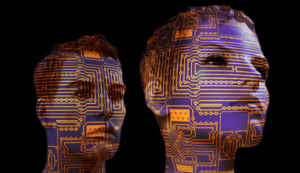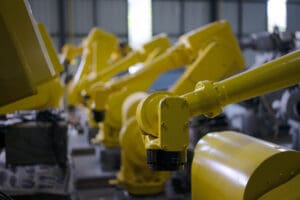By Liv McMahon, Zoe Kleinman & Charlotte Edwards
Artificial intelligence presents a “vast potential” for rejuvenating UK public services, Prime Minister Sir Keir Starmer said on Monday.
In a speech setting out the government’s plans to use AI across the UK to boost growth and deliver services more efficiently, the Prime Minister said the government had a responsibility to make AI “work for working people”.
The AI Opportunities Action Plan is backed by leading tech firms, some of which have committed £14bn towards various projects, creating 13,250 jobs, the government said.
It includes plans for growth zones where development will be focused, and the technology will be used to help tackle issues such as potholes.
But the announcement has prompted questions over how much time and money will be needed to make the government’s vision a reality, amid concerns over borrowing costs and the pound falling to a recent low.
And while estimates from the International Monetary Fund (IMF) support the claim that AI could increase productivity, it also says the changes may come gradually.
The government tasked AI adviser Matt Clifford with creating a UK action plan for supporting the growth of artificial intelligence and its use in public services.
He came back with 50 recommendations which are now being implemented.
Among these is for the UK to invest in a new supercomputer to boost computing power – marking a change in strategy after the Labour government ditched the previous government’s plans for a supercomputer at Edinburgh University.
Sir Keir said AI “will drive incredible change” in the country and “has the potential to transform the lives of working people”.
“We’re going to make AI work for everyone in our country,” he added, saying the “battle for the jobs of tomorrow is happening today”.
Sir Keir said the UK would become one of the AI “superpowers” – mirroring former Prime Minister Rishi Sunak’s drive to boost the UK sector so it could rival that of the US and China.
At the time, many of Sunak’s proposals were geared towards mitigating future risks of highly powerful AI systems.
In October 2023, he said AI could enable faster, easier production of chemical and biological weapons, or be used by terrorist groups to spread disinformation.
He added that in a worst-case scenario, society could lose control over AI.
His government’s emphasis on “safety” seems largely absent in this new plan – instead focusing on maximising opportunities, growth and innovation.
Professor Dame Wendy Hall said the proposals were “ambitious”, but necessary to help the UK keep up with the pace of development.
“It’s an ambitious plan but there’s a lot of upfront investment,” she told BBC Radio Four’s Today programme.
“It will take some time to see a return on that investment and they’ve got to be in it for the long-term.”
How the AI plan could affect you
Among the government’s proposals are:
- AI will be used by the public sector to enable its workers to spend less time doing admin and more time delivering services.
- Several “AI Growth Zones” around the UK will be created, involving big building projects and new jobs.
- AI will be fed through cameras around the country to inspect roads and spot potholes that need fixing
- Teachers and small business owners were highlighted as two groups that could start using AI for things like faster planning and record-keeping.
- AI is already being used in UK hospitals for important tasks such as diagnosing cancer more quickly and it will continue to be used to support the NHS.
The government has also proposed a boost to UK infrastructure as part of the plan, with tech firms committing £14bn towards large data centres or tech hubs.
But shadow science secretary Alan Mak said Labour was “delivering analogue government in a digital age”.
While the push towards AI is seen as way of cutting down on public spending, Mak accused Labour of undermining this goal with its economic policies.
“Labour’s economic mismanagement and uninspiring plan will mean Britain is left behind,” he said.
Science and Technology Secretary Peter Kyle told the BBC there was no reason why the UK could not create tech companies on the same scale as Google, Amazon, and Apple.
“At the moment, we don’t have any frontier conceptual, cutting-edge companies that are British-owned.”
He highlighted DeepMind, which created technology enabling computers to play video and board games, as an example of a former British-born company that was now US-owned.
It was founded by three University College London students before its acquisition by Google.
Tim Flagg, chief operating officer of UKAI – a trade body representing British AI businesses – said the proposals take a “narrow view” of the sector’s contributors and focus too much on big tech.
“AI innovation spans industries, from small enterprises to non-tech sectors, all driving the new industrial revolution,” he said.
“It’s time the government recognised this broader definition and tapped into the full potential of AI across the UK.”
AI ‘not perfect’
There are continuing questions over the risks of introducing AI systems that can “hallucinate” or make things up, or discriminate against certain groups of people due to bias.
Cabinet Office minister Pat McFadden said “we’re only at the foothills of this” and AI was a developing technology.
He said a government-developed AI teaching assistant had been used by about 30,000 teachers in England so far.
“It saves teachers about three-and-half hours a week – gives them their Sunday evening back, if you like, in terms of lesson preparation and classroom preparation,” he told BBC Breakfast.
McFadden said AI applications used by the health service can detect some cancers earlier which are not detectable by the human eye.
However he acknowledged AI was “not perfect” after Apple faced calls to withdraw a controversial feature that generated inaccurate news alerts on its latest iPhones.
“We’ve got to have an eye on safety as well as opportunity,” McFadden said.
“The truth is, you can’t just opt out of this. Or if you do, you’re just going to see it developed elsewhere.”



















